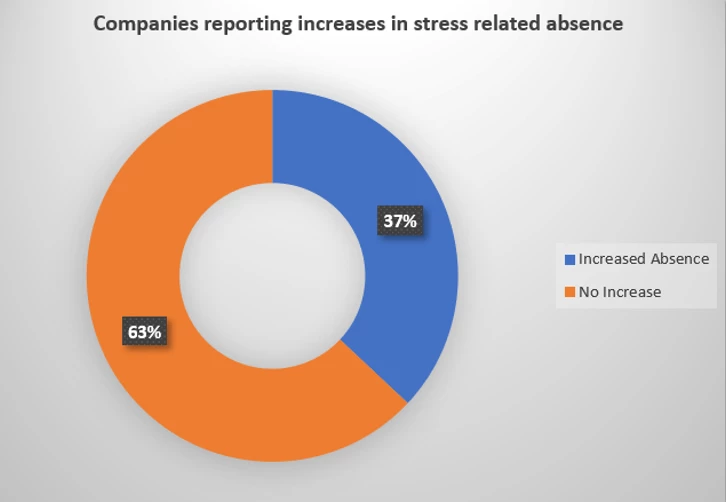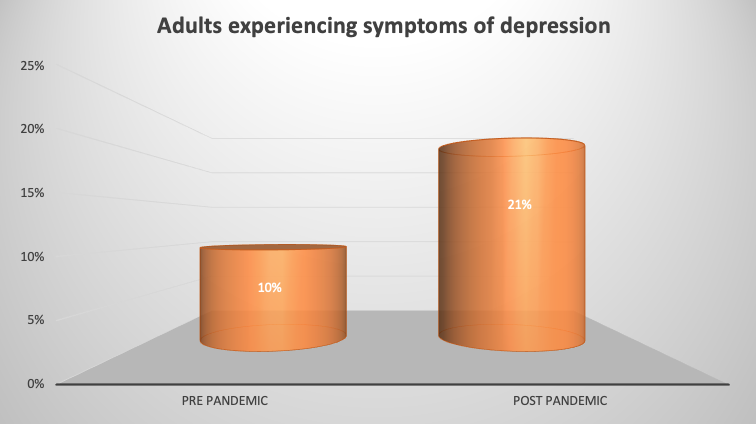- 4 Minute Read
- 19th October 2021
Eight ways companies can support their employees’ mental health
As we try to come to terms with working in and through a pandemic, research suggests that more than 800,000 workers in the UK are struggling with mental health issues. The shift towards remote working has brought with it anxieties around self-isolation and health concerns. A YouGov survey gave a sense of how COVID had affected the nation’s mood with 41% of the population feeling stressed and 38% experiencing frustration.
Now, as restrictions ease and workers return to offices, we’ve collected the best advice from a wide range of HR experts on the steps companies can take to support their employees’ mental health. In doing so they can improve overall wellbeing and help build a healthier and more productive workforce.
Mental Health – the most common cause of long-term sickness absence
Mental health related absence is the most common cause of long-term sickness absence in UK workplaces. According to research from the CIPD 37% of companies responding said that stress-related absence had increased last year. In 2018/19 the HSE found that work related stress, depression and anxiety accounted for 44% of work-related ill health and more than half of working days lost. In addition to absence from sickness, poor mental health at work can result in increased staff turnover, high presenteeism and reduced engagement.

Source: CIPD July 2021
1 in 5 adults experienced depression in early 2021
It’s not yet known how COVID-19 will impact mental health in the longer term but according to the Office for National Statistics around 1 in 5 adults (21%) experienced some sort of depression in early 2021. More than double that observed before the pandemic (10%).

Source: ONS
There are many factors that will affect mental health such as the impact of lockdowns, ongoing restrictions, social distancing and isolation. Some employees will be anxious about contracting the virus and others will be anxious about family and friends. Unfortunately, many employees will have suffered bereavements during this time, under the most difficult of circumstances. Employees may be fearful of job security, returning to work, financial pressures, commuting and the implications of furlough.
Some early research into the health impacts of lockdown have cited fatigue, musculoskeletal conditions, poor work-life balance, reduced exercise and increased alcohol consumption as key outcomes. Looking specifically at mental health, employees were reporting reduced motivation, loss of purpose, anxiety and isolation.
More than half of adults said their mental health got worse over lockdown
More than half of adults (60%) said their mental health got worse during lockdown according to research by mental health charity Mind. Employees who had been furloughed also reported a slight decline in their wellbeing compared to others. All indications are that the pandemic and its effects on normal life will have mental health implications for many for months, and maybe years to come.
The steps companies can take to support their employees’ mental health
The following steps are designed to help employers and people managers to support their employees’ mental health as the pandemic and our economic recovery from it continues. This is likely to be particularly useful for companies planning a return to the office and employees who have been working from home for extended periods.
1. Talk to your team

Companies are encouraged to undertake a companywide survey to find out what changes or benefits their employees would like to see. Try to find out what your employees health and wellbeing goals are, to get insights into what improvements would be valued the most. Use this opportunity to keep health and wellbeing initiatives under review.
2. Adopt a flexible approach
Workload is frequently identified as the no.1 cause of workplace stress. Companies are reminded to look out for people struggling with heavy workloads and working long hours whilst trying to balance home schooling, childcare, elderly care or other demands outside of work. Try to help them through task delegation, time management, flexible hours, revising deadlines or relieving them from attending meetings.
3. Use existing resources
Make sure that you know what existing resources are available to you and your employees. For example, is there an Employee Assistance Programme (EAP) whereby employees can get access to expert help and advice on a range of issues such as finances, childcare, elderly care or relationships?
4. Encourage healthy practices

As people return to the office try to ensure that there are plenty of healthy food and drink options to choose from. Review kitchen areas, snacks and vending machines to ensure healthier options are available. Flexible workspaces (serviced offices and coworking spaces) are leading the way in this regard providing health-conscious refreshments and wellbeing programmes.
Encourage employees to take time out for some daily exercise, great for physical and mental health.
5. Show commitment to wellbeing
Whilst it sounds like hard work, committing to employee wellbeing will deliver clear benefits. “Fostering employee wellbeing is good for people and the organisation,” says the CIPD. Given the general level of anxiety everyone is feeling, it’s the perfect time to commit to employee wellbeing.
6. Use opportunities for collaboration
Thankfully, advances in technology have enabled us to become more connected and to collaborate closely with colleagues whilst working from home. Beyond the home flexible workspaces have evolved as an ideal solution for people struggling with isolation, looking for a safe, productive and collaborative environment.
You can find a flexible workspace near you here.
7. Reduce stigma
The fear of stigma can prevent some employees getting the help they need. Use your employee wellness program to start the conversation and educate. Provide resources for self-help and self-care where possible.
8. Empathise and show leadership
The pandemic has meant that many employees are feeling a sense of uncertainty and heightened stress now about a range of issues. This is a great opportunity for leaders to show that they care and to provide mental health guidance and lift spirits. Managers are advised to check on employees regularly about things beyond work. Companies that show compassion and have a caring and empathetic culture will continue to enjoy a healthy and productive workforce.
